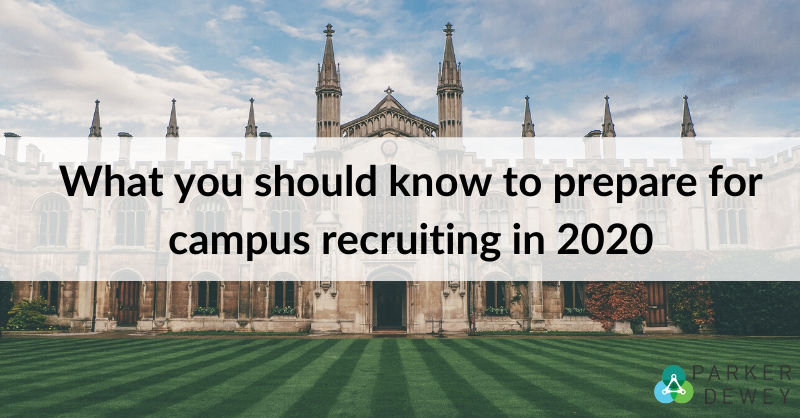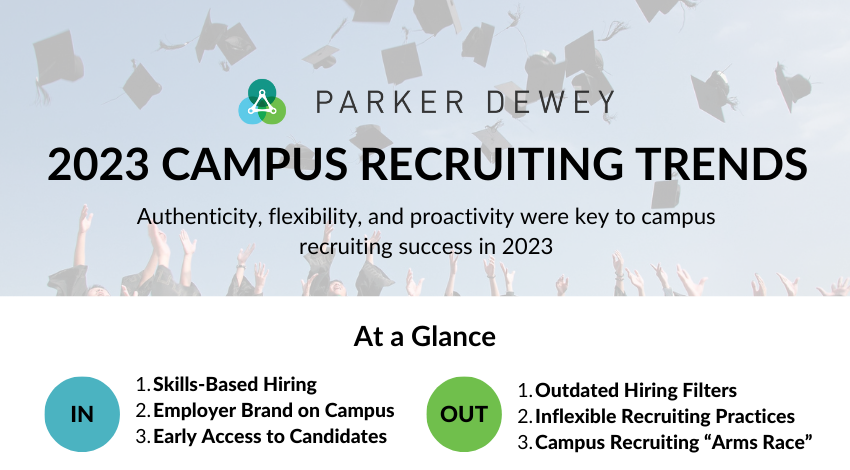
How to Prepare for Campus Recruiting in Fall 2020
Nationwide shifts in the workplace and on campus will force recruiters to forgo their usual university recruiting approach this year.
Even if students return to campus, recruiters will have to rely on virtual recruiting tactics as part of their efforts. While these new strategies are a necessary response to the COVID-19 pandemic, the inclusion of virtual tactics can lead to better recruiting, diversity, conversion, and retention outcomes in the future.
But don’t just take your same strategy and execute it remotely - now is the time to be innovative. As you prepare to recruit for the 20-21 academic year, use these suggestions to help you identify, assess, and hire recent graduates more effectively.
Virtual alternatives have the same challenges as traditional processes
According to Strada, Americans aged 18-24 have shared that online courses are preferred for the rest of the calendar year, with 65% of respondents already canceling or changing their education plans as a result of COVID. Even with social distancing in place, many college campuses will remain closed or inaccessible to visitors for the 2020-2021 school year.
While some students may be on campus, many professionals will not be willing to take flights to get to these campuses. In fact, 65% of company recruiters are unlikely to travel to campus this year, according to Ivy Research Council. For those that are visiting campus, we have yet to hear of anyone who is willing to be in an auditorium with thousands of other people, or even at a small event with a few hundred students.
Before we get into why it is you shouldn’t simply transition your existing recruiting plan to virtual, let’s take a look at some of the most common tactics being used prior to COVID-19; as we’ll come to see, the ability to host meaningful experiences online is exactly what makes existing tactics unproductive.
Virtual career fairs
Without the opportunity to connect in-person, small and large companies alike need to find new ways to build and nurture relationships. Virtual career fairs allow you to reach your target audience, collect their information, and provide information. Yet, without making eye contact as students wander past your table, how do you draw their attention in the first place, and keep it after? Companies will have to rely on their employer brand, with well-known employers battling for attention or trying to overcome preconceived (but often incorrect) notions of students, and relatively unknown employers struggling to make their case.
While you will save money on travel, career fairs are rated as overwhelming to students, and rarely drive meaningful interactions between prospective applicants and your team. Unfortunately, going virtual won’t alleviate these existing issues.
Virtual interviews
Recruiters that are already using phone and video interviews can tell you these mediums present their own challenges, both internally and with applicants. While remote interviews allow companies to engage students that may not be “geographically convenient,” they have many of the same challenges as in-person interviews. One study showed that applicants interviewed through video came across as less likable, while those doing the hiring were viewed as less competent. Inaccurate assessments coupled with negatively rated interviews can hinder hiring efforts. Even brief, asynchronous interviews create barriers as candidates still need to apply and make it through the existing top of funnel filters already in place. Moreover, video interviews can have technical barriers between candidates and interviewers that put candidates without reliable, high-speed internet or a quiet, distraction-free space to fairly participate at a disadvantage.
Though phone and video interviews are still going to be the norm for most initial interactions going forward, if you were having trouble finding top candidates to fill positions from your traditional efforts, what would make a virtual approach bring different results?
Virtual info sessions
Ask any enterprising college student why they attend employer information sessions and their first response will be the food. While students also value the opportunity to meet with real professionals, ask questions, and learn about careers, they universally like the perks of attending. And this is not a bad thing – many students have discovered great opportunities that they only learned about because of the venue. Simply presenting slides with an overview of entry-level opportunities and tips for applying doesn’t engage students whether presented in-person (though at least there’s food) and in a virtual environment, it most likely will not drive engagement by students not already interested in the company. In fact, today’s network savvy college students are more likely to rate employer websites as more useful in gaining information about companies and job opportunities.
While virtual info sessions can help provide information to candidates who are already aware and interested in your company, it is unlikely they will drive engagement from others. In fact, some companies have already used activities or famous speakers as an enticement. However, feedback from students has highlighted that “this is already getting old.”
With these online tactics growing in popularity and out of necessity, what’s going to stand out about them that won’t give you the same results as before?
Experiential recruiting provides an effective alternative
Innovative companies are recognizing new opportunities to enhance traditional processes, even before the global outbreak of COVID-19. Micro-Internships are a great virtual tool that can help your recruiting budget go further and drive better results by offering a low-risk way of interacting with potential applicants. These experiences attract and engage a larger, more diverse talent pool, and allow you to effectively qualify these candidates before investing time and money in interviews. You will be able to connect with inherently motivated students and recent graduates who are (or should be) interested in getting to know your company and your industry, which complements the efforts to build your employer brand.
Micro-Internships also provide early access to candidates as they can be offered year-round, and allow for mutual assessment for both candidate and employer. This helps you build stronger relationships than you could at an info session or career fair, and allows you to get to know them beyond what you can learn from a resume or traditional interview.
Furthermore, when faced with a recession, recruiting teams often suffer the most. This year, you may be asked to do more with fewer resources. Micro-Internships allow you to get help assessing candidates from those who will ultimately work directly with them (explore the benefits Micro-Internships provide to existing employees here). This collaborative hiring approach will help you level up the recruiting process and provide an immediate resource for the hiring manager that needs someone right away. And when you are assessing a candidate’s’ skills from the start, you avoid spending time on interviews that lead to undesired outcomes and saving time from sifting through hundreds of buzzword-filled resumes.
Learn more about launching a Micro-Internship program for Fall and how you can increase meaningful virtual engagement that results in better hiring outcomes.



.png)
